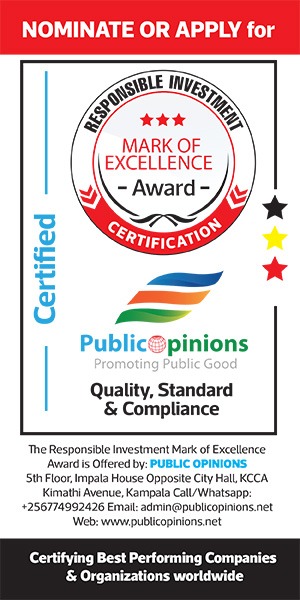
The UN Environment Programme (UNEP) is a Winner of the 2016/2017 Global Sustainable Development Award and Accredited as a Global 500 Sustainable Development Agencies of the year 2016/2017 in appreciation of its contribution towards social-economic development of the world and its contribution towards attainment of United Nations Sustainable Development Goals. Recognised for promoting Environmental Protection as well as informing and enabling nations and people to improve their quality of life, without compromising that of future generations. . Awarded and Accredited by Public Opinions International (Uganda-East Africa) AND Organisation for International Friends of Africa (OIFA).

 Public Opinions International is a Partner and Member of International Organisation for Educational Development (IOED)andInternational Police Commission which is is duly registered as an international Non-Profit, Non-Secretarial, Peacekeeping and Social Development Paramilitary Organization based in the State of California, United States of America with extension commands in member nations of the U.N.The International Police Commission has also been given the Consultative Status from the UN ECOSOC and it is also a Member of the United Nations Office of the Drugs and Crimes “UNODC
Public Opinions International is a Partner and Member of International Organisation for Educational Development (IOED)andInternational Police Commission which is is duly registered as an international Non-Profit, Non-Secretarial, Peacekeeping and Social Development Paramilitary Organization based in the State of California, United States of America with extension commands in member nations of the U.N.The International Police Commission has also been given the Consultative Status from the UN ECOSOC and it is also a Member of the United Nations Office of the Drugs and Crimes “UNODC
The UN Environment Programme (UNEP) was established by GA res. 2997 (XXVII) (1972) following the Stockholm Conference on the Human Environment. It aims to provide leadership and encourage partnerships in caring for the environment by inspiring, informing and enabling nations and people to improve their quality of life, without compromising that of future generations.

The United Nations Environment Programme (UNEP) is the leading global environmental authority that sets the global environmental agenda, promotes the coherent implementation of the environmental dimension of sustainable development within the United Nations system and serves as an authoritative advocate for the global environment.
UNEP work encompasses:
- Assessing global, regional and national environmental conditions and trends
- Developing international and national environmental instruments
- Strengthening institutions for the wise management of the environment
Mission
“To provide leadership and encourage partnership in caring for the environment by inspiring, informing, and enabling nations and peoples to improve their quality of life without compromising that of future generations.”
In 1997, the Governing Council adopted the Nairobi Declaration on the Role and Mandate of the UN Environment Programme, which established the following core mandate for UNEP:
- Analyse the state of the global environment and assess global and regional environmental trends, provide policy advice and early warning information on environmental threats, and promote international cooperation and action, based on the best scientific and technical capabilities available
- Further the development of international environmental law aimed at sustainable development, including the links between existing international environmental conventions
- Advance agreed international norms and policies, monitor and foster compliance with environmental principles and international agreements, and stimulate cooperation on emerging environmental challenges
- Strengthen its role in coordinating environmental activities in the UN system, and its role as an implementing agency of the Global Environment Facility
- Promote greater awareness of and facilitate effective cooperation in implementing the international environmental agenda, and serve as an effective link between the scientific community and policy-makers at national and international levels
- Provide policy and advisory services in key areas of institution-building to governments and other relevant institutions.
In 2005, the Governing Council/Global Ministerial Environment Forum adopted the Bali Strategic Plan for Technology Support and Capacity-building. This was developed to meet the urgent need from within developing countries, and countries with economies in transition, for technology support and capacity-building.
In 2008, the Council/Forum adopted a decision on the Medium-term Strategy of UNEP for the period 2010-13, authorising the Executive Director to use the Strategy in formulating the Strategic Frameworks aud the programme of work and budget for the periods 2010-11 and 2012-13.
In 2010, the Council/Forum adopted the Nusa Dua Declaration, in preparation for the UN Conference on Sustainable Development, or Rio+20 conference, in June 2012. The Declaration articulated the determination and commitments by ministers responsible for the environment to address major issues, namely climate change, international environmental governance and sustainable development, green economy, biodiversity and ecosystems.
Public Opinions International
Organisation for International Friends of Africa (OIFA)
Plot 30 Suite 5, Level 4 Green Land Tower
Opposite Bank of Uganda Kampala Road
P.o Box 35297 Kampala-Uganda
Tel: 256 701 992 426
Email:[email protected]
Web: www.pubopinions.org



















